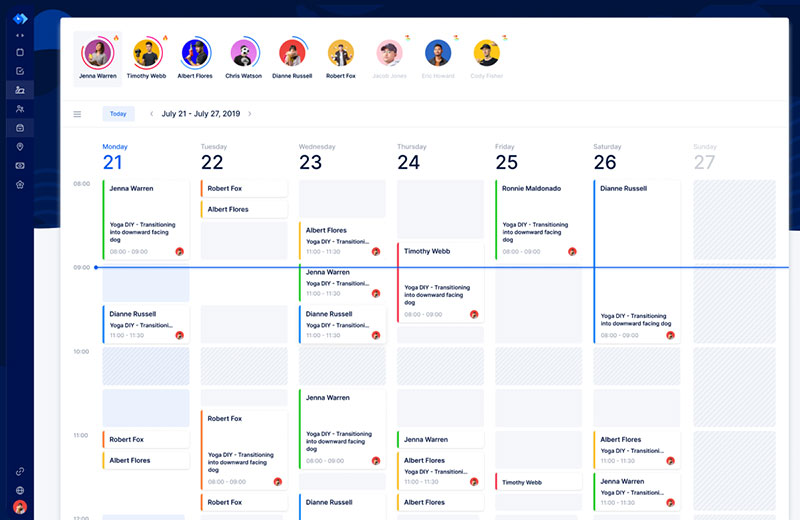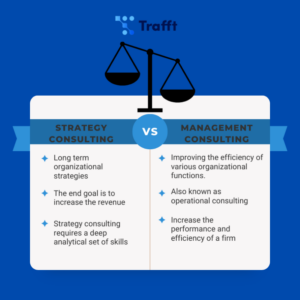Becoming an independent consultant is not easy. You need to find new customers, prepare contracts, get paid, and keep everyone happy. And in order to grow your client base, you’ll need effective marketing strategies designed for consultants who want to maximize their reach.
According to a recent survey, almost a third of all consultants struggle to keep up with marketing. Most consulting business owners only get new clients from referrals. That is true for small consulting businesses. The ones that are able to make more than $150,000 a year say referrals only account for 20–40% of their work. It goes to show that a good marketing strategy will take a consultancy business to the next level.
The thing that many consultants struggle with the most is getting new clients. To improve this aspect of business, it is necessary to have a good marketing plan and to execute it in the right way. Indeed, good marketing strategies will do wonders for your consulting business.
This article will show you some of the best marketing strategies for consultants. Many have benefited from using them, and so can you.
Know the Market
A marketing plan for expanding your client base is not a simple thing. It takes time and effort to make the best of your efforts. And the first thing you should do is get to know your target market.
What is your target market? It consists of the people that need your services the most. You are the one that determines your target audience. Take time to define their needs, what kind of people they are, and how they consume information. That will tell what the best way of communication with them is.
Defining your market allows you to focus your marketing efforts in the right direction. After all, the market that needs your services will be the most likely to respond to your efforts.
An example of a general market could be: “Homeowners that want to save money.” That is a very broad and almost useless definition. How are you going to target that audience?
A more defined market example would be: “Female homeowners in Arizona aged 35–55 who pay more than six percent mortgage interest.” Now you have a well-defined audience, and you can think of ways to reach them and say the right thing.
Develop a Personalized Brand
As an independent consultant, you are now your own brand. One of your marketing strategies for consultants is to define that brand. You need to work hard to stand out from the other consulting businesses on the internet and in the community.
As a business owner, everything you say or do will reflect on your work and company. Before getting started, it is important to think about how you want to present yourself to the outside world. But, even if you fail to do it right from the beginning, there is still time to adjust.
For many, good branding starts with a good online presence in the form of a website. Most prospective clients will use your website to learn more about you and your services. Make a website that is up-to-date, well-written, and professional.
Determine What Makes Your Consulting Business Unique
Another way to stand out from the rest is by emphasizing what makes your service unique. This is your unique selling point or USP. You should describe your USP in one clear sentence.
You can start by thinking again of your ideal clients. What problem do they have, and how can you help solve it? Can you do it better or faster than anyone else? Or do you have highly skilled workers or special technology at your disposal?
Your clients are humans. They try to make rational decisions, so that is something you should keep in mind. Still, at the end of the day, many follow their emotions when deciding what they want or need.
Create a Google My Business Account
Many have found creating a Google My Business account to be a valuable consulting marketing strategy. Add a name and contact details, and try to get reviews from your clients. That will help to increase your visibility in Google searches.
A listing in Google My Business helps your potential clients to find you online, and it adds credibility. People can see your opening hours, the kinds of services you offer, contact details, and pictures.
What’s also important to note is that people can leave reviews for your business and services. People that search for your business will also be able to read those and decide if they want to contact you. So, Google My Business is good for everyone, and it doesn’t cost anything.
Become a Thought Leader
Presenting yourself as a leader in your field is one of the most powerful marketing strategies for consultants. You can do this by publishing a blog, using your website or a platform such as LinkedIn. Using a LinkedIn feed on your website and LinkedIn adds credibility to your blog, and you will reach an audience that you may not reach by other means.
Also, you can look for good opportunities to speak about your work. Contact professional organizations and speak at conferences or through local media. Again, this is an opportunity to reach a new audience.
Good content is crucial
Content is not always about increasing direct sales. According to the Content Marketing Institute, it is about educating and providing information. As a marketing plan, this is more effective than forcing your product or service on people.
Credibility is key to achieving consulting success, but how do you build trust in people that don’t know you? Offering valuable and insightful content is one of the ways to do that.
The kind of content you publish is part of your brand and establishes your image. If people like your content or find it useful, they will start trusting you as an expert. Publishing fresh content on a regular basis also increases your visibility.
You can decide what to write about by thinking of questions clients often ask you. You can answer people’s questions each time you write a blog. Some find it helpful to write a blog in the form of an email to a friend.
The type of content you can share
What media can you use to publish your content and establish yourself as a thought leader? Here are some ways:
- Blog Posts. Learn how to write effective blog posts that are relevant to your target market. This is a very effective way of spotlighting your knowledge and way of thinking. In your blog, you can use your experiences from your consulting business, trends, solutions, and tips.
- E-books. In an e-book, you have more time and space to discuss a topic. You can give more details and value to your audience. The purpose of e-books is to educate people about a general topic, and they give you the opportunity to explain your vision. You can also use them to explain your methods and discuss case studies.
- Podcasts. Podcasts are very popular because people can listen to them wherever they want. Many find it a more personal way of engaging with an audience. You can share opinions and insights on different subjects and interview other experts. You can also include a section where you answer questions from your listeners.
- Webinars. These can be live or recorded and give you an opportunity to have a direct interaction with your audience. Hosting webinars create opportunities to educate, demonstrate a service or product, or answer questions.
- Social Media Pages. Social media marketing is very powerful. You can go a bit broader with your content and interact more freely. It is a good place to promote your blog, podcast, webinar, and other content.
- Online Publisher Sites. Popular content includes interviews, expert roundups, and thought leadership articles. This is an opportunity to exploit and forge connections with other industry experts and influencers. You can try to feature them on your content outlets.
Speak at events
Industry events are occasions for networking, but you can get more out of them than that. When you speak at these events, you can demonstrate your skills and abilities to your peers. You can also give your audience some useful tips and advice.
Speaking opportunities present themselves at local meetups. There, you can speak about your work, explain techniques, and give updates on trends in your industry.
Conferences are often organized for those that work in a certain field of wo If you have a special niche, it would be good to talk about that.
Leverage the Power of Social Media
This point may seem obvious to many. According to Statista, social media advertising cost a total of $230 billion in 2022. The expectation is that this figure will rise to more than $300 billion in 2024.
Some forget it, but it is crucial that you keep your social media pages up-to-date and professional. Your social media presence should bring in customers! Post new things on a regular basis and keep an eye on comments and respond to them.
You can make advertising on social networks part of your marketing plan. But you can be very effective for free. Try to create a lively community where people talk, discuss, and ask questions. In your comments, you can provide information, suggestions, and useful links. Ask questions yourself to start a conversation.
With time, your social media pages become a place where people go to find information. You will reach your target audience and increase trust in people.
How consultants can use social media

As a consulting business owner, you can use social media in different ways. Here are some suggestions:
- Brand building. Because you can share your expertise and insights through your social network, people get to know you as an expert. They will see what kind of person you are and, importantly, how your business works.
- Content promotion. You can publish and promote your content by writing your own blog or adding links to articles, infographics, videos, or other media. This can reach a wide audience and increase your online presence. It is a good way to direct people to your business website.
- Networking. Through social media, you can connect with new clients, colleagues, and influencers.
- Reputation management. From the comments, you can learn a lot. It shows you how people look at you, and it gives you a chance to respond.
Choose the right platform
There are many different social media networks, each with a specific focus and audience. So, it is important that you choose the right one for your consulting business.
You define your ideal client or target audience by their demographics, preferences, and behaviors. Keeping these in mind will help you choose the most effective social media platform. If your audience consists of professionals, for example, LinkedIn would be an excellent choice.
Some 800 million professionals use LinkedIn worldwide. It is the first choice for many professionals for connecting with other individuals and businesses. It has helped them to get in touch with new clients, hire talent, and generate leads.
How can you get the most out of your LinkedIn account? Here are some tips:
- Find prospective clients through LinkedIn and interact with them. There are several LinkedIn prospecting tools that make this job easy by automating part (or all) of the task.
- Create, publish, and promote your and others’ exciting content.
- Forge your online presence.
Content types
There are many factors that determine your content. These include target audience, niche, and marketing plan. Below you will find some examples that can inspire you to create the right content.
- Educational content. Educate your audience by sharing insights, trends, and useful tips. It establishes you as an expert in your particular field. You can do this through a blog, article, webinar, video, or something else.
- Case study or success story. Share some real-life experiences from your practice. Show the expertise you have and what you were able to achieve.
- Look behind the scenes. This allows you to show people how you work and what you do day by day. This makes you more relatable.
- Engaging content. This is a specific kind of content where you invite your audience to respond. This includes surveys, polls, quizzes, and so on. It gives you feedback and starts conversations.
- Promotional content. You can use digital marketing to promote your work. Invite people to events and workshops and ask them to use your services or products to generate leads. Take care not to overdo it. Keep a pleasant balance between educational, engaging, and promotional content.
Collaborate
Co-marketing is beneficial for your consulting company. It means that you work with other businesses and you promote each other’s services and products.
Working with other businesses gives you access to a new market, new resources, and different expertise. That will help you to make the most efficient use of your marketing plan. Consulting businesses in particular must make good use of co-marketing methods. Why is that, and how can you do it?
- Expanded reach. By working with complementary businesses you get access to a new potential customer base.
- Shared resources. By co-marketing, you can make use of a larger pool of resources. You will be able to share a budget, networks, and marketing expertise.
- Enhanced credibility. To benefit in this way, you need to partner with well-known businesses. Their brand will have a positive impact on the way others see your consulting service.
- Diversified marketing channels. A partnership can give you access to new marketing channels. These channels might allow you to reach a new audience.
Potential partners
Potential partners should have similar, but not the same, target audiences, goals, and values. Some options for you to think about as the owner of your own consulting business are:
- Complementary service providers. Think of bureaus that offer complementary services and products. Imagine you do marketing consultancy. Then you could partner with a web designer or someone that works in content marketing.
- Industry associations and organizations. You can increase your visibility and credibility by partnering with an industry association. This will benefit you most within your target industry. It allows you to collaborate through events and webinars and reach a larger audience. Don’t forget: you will also become known in the industry as an expert in your field.
- Influencers and thought leaders. Influencers and thought leaders will help you to build credibility and reach a larger audience. They can help you to create relevant content online or for webinars and podcasts. You can also tap into their pool of followers.
- Local businesses. Partnering with local companies is smart if you target a geographic area. This works best if these businesses have a similar target market. Don’t forget about networking groups, chambers of commerce, and similar institutions in your area.
Include Referrals in Your Marketing Strategy

Referrals are a great strategic plan to improve your marketing efforts. That is because referrals have much higher conversion rates than regular leads. You know that’s true because you will trust the recommendation of a friend.
Here are more referral-related statistics:
- 92% of people trust recommendations from friends, family, and acquaintances.
- Referrals have 30% higher conversion rates than regular leads.
- It is four times more likely that a referred person will end up buying a product.
Getting referrals takes effort. Remind your clients that you welcome referrals and you can encourage them by setting up a reward system for referrals. You can offer discounts or other favors if someone brings in a new client.
You can also make use of referrals by starting partnerships with other companies.
Why do you need referrals
Why does your consulting business need referrals? Here are some benefits:
- Increased credibility and trust. People are more prone to trust someone they know over an advertisement.
- Better conversion rates. Prospective clients that come in through a mutual friend are more interested in your service. Hence, it is easier to turn them into paying customers.
- Cheap marketing. Referrals are cost-effective, relying on other people doing the word-of-mouth marketing for you. It requires little financial investment from you.
- Expanded reach. Your happy customers will use their own networks to spread the good news about your services. They can reach people that are hard to contact through your business’ marketing plan.
Offer incentives
Incentives motivate people to look for referrals. Be quick to offer incentives for referrals to all your new customers.
Your incentives can take different forms. For example:
- Discounts and special offers. Special offers and discounts are strong incentives for clients to promote your services to their friends.
- Referral bonuses. These bonuses could be monetary. You can promise a fixed amount or a percentage of what you make of the referral. You can also reward in the form of gift cards or similar rewards.
- Special services or exclusive access. This is talking about premium content, services, or workshops. This gives your clients the feeling that they are special to you.
- Partnership opportunities. You can consider setting up partnerships with complementary businesses. That creates a situation where two parties benefit. Both businesses can refer their clients to the other for complementary services.
Think About Partnerships
This kind of partnership is another way of getting more clients for your own business. Larger forms have different types of expertise and more marketing resources. You can work with them and share leads.
A nice way of partnering is by organizing webinars and in-person events together. Promotional events and giveaways are other marketing methods that you can exploit. It also helps you to build a professional network.
As a consultant, you have many partnering options. For example:
- Legal and engineering
- Financial and human resources
- Operations and management
- Sales and marketing
- Web design and content providing
What you could do, let’s say, as a sales consultant, is to contact a local marketing bureau. You can tell them that you will send referrals to them if they do the same for you.
This makes sense because the step after marketing is sales. So, first, the clients receive help with setting up a marketing plan, and then they need help with sales. After they get their sales going, they probably need help with improving their marketing. Build a network where you can send and receive referrals.
Join associations and online communities
New independent consultants often lack a community, which is a big challenge. Taking active steps to join a community, local or online, is very beneficial. You can find mentors, partners, and a source of referrals.
Where do you find useful communities? Here are some options.
- Discord spaces
- Facebook groups
- LinkedIn connections in your niche
- Slack groups
- Local professional organizations and associations
The benefits of joining an association
There are many benefits to joining a professional community or association. Here are some of them:
- Networking. Many professional associations organize events, such as workshops, conferences, and webinars. These are not only sources of information but also opportunities to work on your network. You can meet potential clients, other consultants, mentors, and industry leaders.
- Professional development. Consultant associations give access to resources, publications, training programs, and other tools. It helps you to increase your knowledge and skills.
- Credibility and recognizability. By joining, you will become part of their code of ethics, certification program, and quality assurance system. They need that from their members in order to keep up a standard, and your business gains credibility.
- Advocacy and support. Another aspect of a professional association is that it represents your needs and interests. They look after the rights and welfare of their member consultants. For example, they advocate better policies and regulations, and they give legal advice and help.
Make good use of networking events
Networking is an integral part of a marketing plan. Local networking events are excellent places to start building your professional network. Other networking opportunities are webinars. You can search the internet for speakers in your niche or area of expertise.
A survey by Consulting Success showed that the second-most successful approach to marketing is networking, just after getting referrals.
Both in-person and online occasions for networking are effective. If you pick the right events, you will find a crowd of people that have similar interests. That does not only include consultancy professionals but also others that share interests. Think, for example, about people that look for freelancers and similar service providers.
Of course, an event that is all about your niche in consultancy is the best opportunity to expand your network. As a sales consultant, look for sales conferences and other events. As a small business, you should keep in mind local business events.
The Importance of Marketing Automation for Consultants
In running your consulting business, you will come across many repetitive tasks. These tasks take a lot of time, time you could better spend on other things. Using software can streamline your business by automating many of those repetitive tasks. Marketing automation in particular has many benefits:
- It saves time and resources. Email marketing, social media posting, lead generation, and analytics are among the tasks that you can automate. You will save time and resources and you can use them in other parts of your business.
- Increased efficiency and efficacy. Marketing automation can generate useful data and insights. It can teach you about your audience, how to personalize your message, or how to improve your strategy. The good thing is that you can measure the results.
- Enhanced customer relationships. Marketing automation tools remind you to communicate with customers at the right time. They help you also to use the right message and the most effective channel.
- Better customer management. Automation tools contain a centralized system for managing and tracking customers. You can keep an eye on how they interact, what they prefer, and other behaviors.
- Personalized solution. Each consultant has different needs. Automation tools provide what you need and help you track the results.
Trafft: Handles your marketing and your bookings
Trafft is one of the most powerful automation solutions on the market. Besides enabling you to manage your bookings and organize your schedule, Trafft handles different aspects of client management.

Capture new leads with ease through Trafft’s marketing tools integrations. Leverage the power of Google Analytics, Meta Pixel, and Google Tag Manager to increase the number of booked consultations.
The custom fields option on your booking page allows you to collect customer info, whereas MailChimp and SendFox automate the way you engage with and nurture your clients. Use these tools to offer promotions and send them automatic newsletters, reminders, birthday greetings, and coupons. This will boost customer loyalty and result in repeat customers, ensuring your schedule stays full at all times.
If you’re like us, you’re always looking for ways to streamline your processes and make life easier. That’s where Trafft comes in! We’ve built the ultimate scheduling and automation tool, designed specifically for consultants like you. Let us show you how Trafft can revolutionize your workflow.
Trafft’s powerful features every consultant will love
- Automate Scheduling: Save time and cut the back-and-forth with clients. Trafft’s intuitive scheduling system makes it a breeze to book appointments, manage your calendar, and reduce no-shows. Your clients will love the seamless experience, and you’ll love the time it frees up for you to focus on what really matters – your consulting work.
- Customization Galore: Your brand is essential, and we get that. Trafft allows you to fully customize the look and feel of your booking page to match your unique brand identity. Plus, you can tailor the booking process to your specific needs – offer different appointment types, set buffer times between bookings, and even create custom booking forms. Now that’s flexibility!
- Payments Made Easy: Trafft integrates with popular payment gateways like Stripe and PayPal, making it effortless for your clients to pay for your services. Say goodbye to chasing down payments and hello to smooth transactions.
- Integrated Video Conferencing: In today’s digital world, virtual consultations are the norm. Trafft’s got you covered with seamless video conferencing tools like Zoom and Google Meet.
- Robust Analytics: Data is power, and Trafft’s analytics tools put that power right at your fingertips. Track your bookings, revenue, and even client satisfaction with just a few clicks. Use these insights to optimize your consulting business and keep your clients coming back for more.
- Rock-Solid Support: We’re here for you, 24/7. Our dedicated support team is always ready to help you with any questions or issues you might have. Because when you succeed, we succeed.
So, are you ready to level up your consulting business and leave the scheduling headaches behind? Give Trafft a try – we’re confident you’ll love it as much as we do.
FAQ on Marketing Strategies for Consultants
What are the best marketing strategies for consultants?
There’s no one-size-fits-all answer here, as the best marketing strategies vary depending on your niche and target audience.
However, some proven strategies to help you promote your consulting business include content marketing, social media, email marketing, networking, referrals, public speaking, webinars, podcasts, and online ads.
Focus on the strategies that resonate with your audience and align with your strengths, then measure results and adjust as needed.
How can I effectively use content marketing as a consultant?
Content marketing is all about providing valuable information to your audience. Start by identifying your target audience’s pain points, questions, and challenges.
Then, create content like blog posts, e-books, videos, or podcasts to address those topics. Remember to be consistent in your content production and always provide value. Finally, promote your content through social media, email marketing, and other channels to reach a broader audience.
Which social media platforms should I focus on as a consultant?
Ah, the age-old question! The answer depends on your target audience and niche.
If you’re targeting professionals or B2B clients, LinkedIn might be the best platform for you. If your audience is more visual, Instagram or Pinterest could be a better fit.
Research where your target audience spends time online and choose the platforms that align with your consulting niche. It’s better to focus on a few platforms and do them well than to spread yourself too thin.
How can I use email marketing effectively?
Email marketing is a powerful tool for consultants, as it allows you to build relationships and nurture leads. Start by creating a compelling lead magnet, like a free e-book or a webinar, to encourage people to sign up for your email list.
In addition to email marketing, cold pitching can be an effective strategy to reach potential clients directly. Once you have an audience, create a series of automated emails to welcome new subscribers and provide value. Regularly send newsletters with helpful content, case studies, and promotional offers. Just be sure not to overwhelm your subscribers with too many emails.
Why is networking essential for consultants?
Networking is essential for consultants because it helps them build relationships, establish trust, and gain referrals.
By attending industry events, conferences, and meetups, you can connect with potential clients, partners, and influencers in your field. You never know where a new connection might lead, so always be prepared to make a strong first impression and follow up after events to nurture relationships.
How can I get more referrals as a consultant?
Referrals are a fantastic source of new business for consultants. To get more referrals:
- Provide exceptional service to your clients, so they’re eager to recommend you.
- Don’t be afraid to ask for referrals. Clients may not think to refer you unless you ask.
- Offer incentives or discounts for referrals.
- Build relationships with complementary service providers who can refer clients to you.
- Join industry associations or networking groups to connect with potential referrers.
How can public speaking help my consulting business?
Public speaking positions you as an expert in your field and helps to build credibility. By giving talks at industry events, conferences, and workshops, you can showcase your knowledge and skills while reaching a wider audience.
Public speaking also provides opportunities to network with potential clients, partners, and influencers.
Make sure to have a strong call to action at the end of your presentations to encourage further engagement.
Closing Thoughts on Marketing Strategies for Consultants
To be effective at marketing as a consultant, you need to know your audience, create a strong identity, and have a network. Co-marketing, working with other businesses, and joining associations are important elements. On top of that, you need a strong online presence and engaging content.
The way this mix works depends on your market and customers. If your potential clients don’t go to local events, then there is no need for you to go. Find out where they go and meet them there.
Marketing strategies for consultants are the key to success. Invest in them, even if you have little time. You never know when you need new clients. Keep looking for them and maintain a pipeline of new projects for your consulting business.
Ready to Dive in for More Fun?
Check out these extra resources to uncover all the details about the consulting business:
- How to Promote Your Consulting Business? From A-Z
- How to Get Clients as a Consultant – Quick Guide to Follow
- Consulting Slides Best Practices & Examples from Big Companies
- How Much to Charge as a Consultant
- The 30 Best Apps for Consultants
- The Best Consultant Scheduling Software for Busy Consultants
- The Business Consulting Software You Need to Succeed









